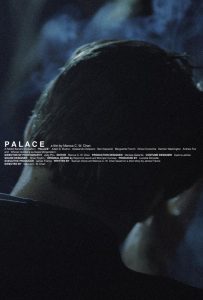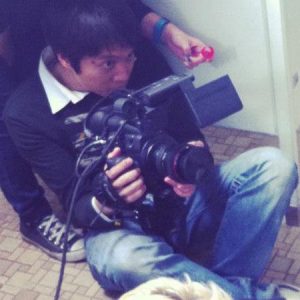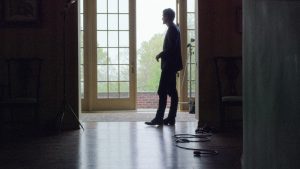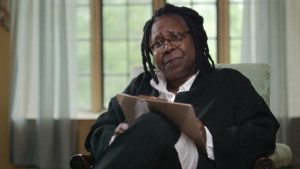NRFF Interviews Director Marcus C. W. Chan
Palace
Movie • 12 min • Drama USA
DIRECTED BY Marcus C. W. Chan
*WINNER Best International Film at NRFF LONDON 2017
Writer: Sam Icklow Producer: Lucretia Stinnette Executive Producer: James Franco DoP: Judy Phu Cast: Whoopi Goldberg, Adam Budron, Alessandro Delpiano
Synopsis
 William Stack is best known as the child actor who regularly appeared on CNC’s “Dance with the Devil”, where he played a young boy molested by his baseball coach. His leap to stardom at the tender age of 8 was followed by a string of commercials and film and television roles. But soon, it all caught up with him. Parties, drugs, arrests. By the time he was 12, he had been fired from the show and soon he was in and out of rehab. Tonight we will take a look at his meteoric rise to fame, his shocking fall from grace, and what the future may hold. Tonight, we will take a look at the dark side of Hollywood, and the possibility of a silver lining.
William Stack is best known as the child actor who regularly appeared on CNC’s “Dance with the Devil”, where he played a young boy molested by his baseball coach. His leap to stardom at the tender age of 8 was followed by a string of commercials and film and television roles. But soon, it all caught up with him. Parties, drugs, arrests. By the time he was 12, he had been fired from the show and soon he was in and out of rehab. Tonight we will take a look at his meteoric rise to fame, his shocking fall from grace, and what the future may hold. Tonight, we will take a look at the dark side of Hollywood, and the possibility of a silver lining.
Congratulations on winning Best International Short for ‘Palace’ at the New Renaissance Film Festival, LONDON 2017. How does it feel?
I am absolutely thrilled by this great news! The whole “Palace” team is proud to be featured by the New Renaissance Film Festival. We all feel really blessed.
Tell us about the central character in the film and his journey. What inspired you to write about the harrowing yet important issue of child abuse in Hollywood?
 The film was made as part of a UCLA thesis class taught by James Franco and I was one of three directors in his class. Each of us picked and adapted one of the short stories from his short story collection “Actors Anonymous” into our own thesis short film and the three short films are meant to be combined into a feature film, which is currently in post-production. The script of “Palace” was very loosely adapted by my writer Sam Icklow and I from a short story of the same name from the book, which I picked because it is one of the more complex stories in there. Sam and I however did not really adapt the original story as much as just taking the setting and the subject matter: Hollywood and child molestation. We aimed at re-creating the strange world of child actors, which we have encountered many times during our time at UCLA.
The film was made as part of a UCLA thesis class taught by James Franco and I was one of three directors in his class. Each of us picked and adapted one of the short stories from his short story collection “Actors Anonymous” into our own thesis short film and the three short films are meant to be combined into a feature film, which is currently in post-production. The script of “Palace” was very loosely adapted by my writer Sam Icklow and I from a short story of the same name from the book, which I picked because it is one of the more complex stories in there. Sam and I however did not really adapt the original story as much as just taking the setting and the subject matter: Hollywood and child molestation. We aimed at re-creating the strange world of child actors, which we have encountered many times during our time at UCLA.

Has there been any resistance to the film because of the ‘taboo’ topic? How have audiences responded?
I haven’t seen any resistance at any of the screenings I have attended so far. I remember fearing that some people might interpret the film as saying that the kid enjoys being molested, which is not my intention, but it seems that all of our audiences so far are intelligent enough to avoid that simplistic interpretation.
Oscar-winning actress Whoopi Goldberg plays the psychiatrist in the film. How did she and James Franco get involved?
James Franco taught the thesis class so he was my thesis chair. Franco was very kind and resourceful and he asked the three directors to each give him a dream cast list of actors whom he will try to reach out to and get them on our projects. I asked for Whoopi because I think she would play a great TV personality. Apparently she is friends with James so he gave her a call and she said yes! She was fantastic to direct and not as nerve wracking as you might think.

How did you raise the finance for the film?
The film was mainly funded through the Edie and Lew Wasserman Production Fellowship and the Rabbit Bandini Productions Award.
What was the most challenging scene to film and why?
The last scene when William Stack watches his younger self from his car was quite challenging. We were filming the child actor, Alessandro Delpino, as he walked down busy Sunset Boulevard and we were basically just shooting from inside a car moving next to him as he walked. We did not have any camera rig and the traffic was really bad — we had to drive really slow to get the shot and there were people honking at us non-stop — so it took us many takes before we got what we wanted.
Have you always wanted to be a director? What films inspire you?
I think I have always wanted to be part of the filmmaking world because cinema is what inspires me and what gave me my education. I remember at my UCLA interview I was asked which five films I would bring to an island, and my answers were “Happy Together” by Wong Kar Wai, “A Brighter Summer Day” by Edward Yang, “Manhattan” by Woody Allen, “Il Posto” by Ermanno Olmi and “La Collectionneuse” by Eric Rohmer. I also said I wanted to make realistic films like those of the Dardenne Brothers, but I think all the films I made at UCLA ended up being quite surreal with fantastical elements. So I guess people change.
What is the central message of ‘Palace’ that you want audiences to understand?
When I was a kid I experienced a lot of physical (fortunately not sexual) abuse and so the idea of abuse victims carrying the burden of the abuse and potentially “spreading” the damage to others (but not really paying it back to their abusers) really resonates with me. It is so “unfair” in a sense and I feel really helpless every time I think about it, and so that is one of the main things I wanted to explore in “Palace”.
What are your plans for the film? Have other festivals picked it up?
I am still submitting it to other festivals. Right now it has been accepted by LA Shorts Fest and Hollyshorts Film Festival, and it was a finalist at the Hong Kong Independent Film and Video Awards (I am from Hong Kong). I am confident it will have a good rest of its festival run and my ultimate goal is to make it available through online short film distribution and also to use it as a showreel for my next project.


